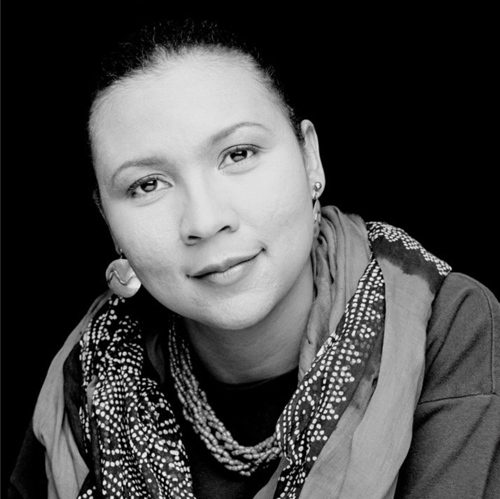bell hooks, celebrated feminist theorist, cultural critic, artist, and writer, died on Wednesday, Dec. 15 at her home in Berea, KY. She was 69.
hooks was the author of over two dozen books that ranged from the groundbreaking text Ain’t I a Woman? Black Women and Feminism to her deeply felt memoir Bone Black: Memories of Girlhood to her acclaimed children’s book Happy To Be Nappy.
She was also a proud graduate of UC Santa Cruz, earning a doctorate in literature in 1983 with her dissertation on Toni Morrison. “It was here as a graduate that I dared to dream beyond the fate that was designated for me as a Black woman,” hooks said during a 2007 lecture she gave on campus.
“Her career has been extraordinary,” said Bettina Aptheker, a longtime friend of hooks and Distinguished Professor of Feminist Studies at UC Santa Cruz. “I know from teaching her work in my classes what an enormous, and lasting impact her writing has had on generations of our students—and on generations of scholar-activists across our country and the globe.”
Born Gloria Jean Watkins on September 25, 1952, hooks grew up in Hopkinsville, Kentucky. Her parents, Rosa Bell Watkins and Veodis Watkins, were a homemaker and a postal worker, respectively. As a child, hooks showed a hunger for knowledge, spending all of her free time reading and dreaming about leaving her hometown.
As her siblings said in a statement following hooks’ death, “Gloria learned to read and write at an early age and even proclaimed she would be famous one day. Every night we would try to sleep, but the sounds of her writing or page turning caused us to yell down to Mom to make her turn the light off.”
hooks eventually landed at Stanford University, where she earned a degree in English literature in 1974. Her studies continued at University of Wisconsin, from which she obtained a master’s degree in English in 1976.
Soon after, hooks began her career as an educator at the University of Southern California, where she was a senior lecturer in ethnic studies and a professor of English. It was during her time there that she adopted the pen name bell hooks for a chapbook of poems, And There We Wept. As she has often repeated, it was chosen in honor of her maternal great-grandmother and set in lowercase letters to put the emphasis on her writing rather than her name.
Her first major work Ain’t I a Woman? was published in 1981, though she began drafting it during her time at Stanford. The book, which borrowed a line from a famous speech from Sojourner Truth in support of women’s suffrage, explored the impact of slavery on the ongoing maltreatment of Black women in America. “A devaluation of black womanhood occurred as a result of the sexual exploitation of black women during slavery that has not altered in the course of hundreds of years,” hooks wrote in the book.
The book was praised as groundbreaking upon its publication and has since become a canonical text in the study of feminist theory. As author Min Jin Lee put it in a 2019 essay on hooks, written for the New York Times, “For me, Aint I a Woman was as if someone had opened the door, the windows, and raised the roof in my mind. I am neither white nor black, but through her theories, I was able to understand that my body contained historical multitudes and any analysis without such a measured consideration was limited and deeply flawed.”
From there, hooks went on to produce many more books, including the award-winning 1991 work Yearning: Race, Gender, and Cultural Politics; 1995’s Art on my mind: visual politics; and Feminism is for everybody: passionate politics, published in 2000, with a number of them becoming required reading in high schools and colleges around the world.
“It’s hard to quantify her impact, it’s been so immense,” said Robin Kilson, then an associate professor of history and women’s studies at MIT, in a 1995 article on hooks from the Chronicle of Higher Education. “Is there any other black woman author who turns up on as many bibliographies? The answer is ‘No.’ She’s everywhere.”
Along with her steady stream of writing work, hooks maintained a vibrant career in academia. She served as a professor of English and African and Afro-American studies at Yale, was associate professor of American literature and women’s studies at Oberlin College, and was a distinguished professor of English at City University of New York. Since 2004, she was a Distinguished Professor in Residence in Appalachian Studies at Berea College in Berea, Kentucky and helped establish the bell hooks Institute there for students to study her writing and teaching work.
“Reciting bell hooks’ academic milestones doesn’t do justice to the influential reach of her writing spanning 40 years,” said Literature Department Chair Carla Freccero. “Her work was always accessible, sometimes difficult, always passionate, lively and honest. Most women I know can remember at what point in their lives they read which books, which essays, and how that experience of reading changed their lives.”
hooks is survived by her four sisters, Sarah Chambers, Angela Malone, Gwenda Motley, and Valeria Watkins, as well as her brother, Kenneth Watkins.



